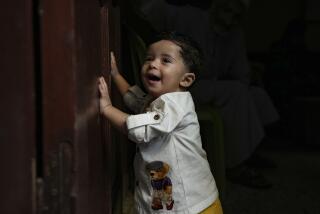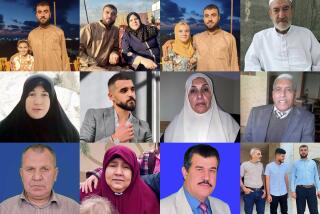Gruesome Change From the Ordinary
- Share via
BEIT FAJJAR, West Bank — The family and friends of Andalib Takafka gathered Saturday to celebrate not a life but a death. Andalib was 18 and had lived an uneventful life. Everything about the girl, her mother said, meaning no unkindness, was ordinary.
On Friday, the teenager rose at 6 and made tea for her parents, as she did most days. She left her home in this West Bank town near Bethlehem without a word. “Andalib was always quiet,” her mother said. Her parents supposed she was going to her job as a seamstress.
But that particular morning, she was headed for Jerusalem. Somewhere she made a stop to pick up the tools of death. Then, shortly after 4 p.m. on crowded Jaffa Street, she blew herself sky high, killing, herself and six others and wounding more than 80. Her victims included Arabs and Jews. They were all civilians.
As has happened scores of times in Israel during the last 18 months, an ordinary life had turned into an extraordinary death and the echo traveled far.
Secretary of State Colin L. Powell responded by canceling his Saturday meeting with Palestinian Authority President Yasser Arafat. Arafat, desperate for U.S. help to halt the Israeli offensive in the West Bank, responded by condemning all forms of terrorism, specifically that one committed by Andalib Takafka. Their meeting was rescheduled for today.
When they gathered Saturday afternoon in the family compound, the girl’s relatives did not know that Arafat had not, publicly at least, bestowed martyr status on Andalib. The women sat in one room with Aziza Takafka, 44, who held a picture of her daughter. They talked quietly, without the tears and wailing that mark wakes for those killed by the Israelis.
“Andalib was just ordinary,” her mother said. “She was an ordinary student. She did ordinary things like every teenager. She never seemed political. I could never imagine her doing a thing like this. If I had known she was planning it, of course I would have pleaded with her to stop. I am a mother.”
In the next room, the men sat with Khalil Takafka, 66, Andalib’s father, smoking and drinking coffee. Festive music played on a tape recorder. He said he was proud of what his daughter did. And what if his eight other children also decided to become suicide bombers?
“They are free,” he said. “If they want to do it, it is up to them.”
Although the Takafkas could not explain what had transformed their daughter into someone willing to kill and be killed, they said they had seen changes in her in recent weeks, as she sat transfixed watching TV news reports of the military campaign Israel launched in late March precisely because of youths like Andalib.
“Sometimes she looked so sad, it made me cry,” the father said.
About three weeks ago, her mother said, Andalib began to spend more time reading the Koran. There were moments, between the periods of sadness, when Andalib seemed very happy and was always smiling. Aziza Takafka asked her daughter why she seemed so happy.
Andalib said, “Mother, someone is going to ask for my hand in marriage. Please say yes,” Aziza Takafka recalled. But the mother knew that in conservative Palestinian society, a girl doesn’t suddenly show up at home with a mysterious boyfriend, and she began wondering whether her daughter was referring to someone other than a husband.
The bomber was originally identified on TV as a woman named Nidal Daraghmeh. So the Takafkas had no idea that their daughter was responsible until 200 Israelis rolled into Beit Fajjar in armored personnel carriers at 1:30 a.m. Saturday and headed for the Takafkas’ modest home on an unpaved street.
The soldiers questioned family members in separate rooms and left with Andalib’s brother, Ali, 19.
Beit Fajjar is a quiet village, isolated from the fighting of the last month, which makes Andalib Takafka’s emergence as a suicide bomber all the more unusual.
What does seem clear is that, although many Palestinians cheer the bombers as martyrs, the attackers often end up accomplishing the opposite of their goals. Bombings are met by a tough Israeli response, which has largely destroyed the Palestinians’ infrastructure in the West Bank. And rather than gathering sympathy for the Palestinian cause, the bombings--which are aimed at civilians--have caused revulsion in the international community.
“We have no other opportunity to strike back,” said Mahmoud Eliam, a teacher in Beit Fajjar for 40 years. “We don’t want to kill innocent people, but the bombings are a sign of our desperation.”
More to Read
Sign up for Essential California
The most important California stories and recommendations in your inbox every morning.
You may occasionally receive promotional content from the Los Angeles Times.










